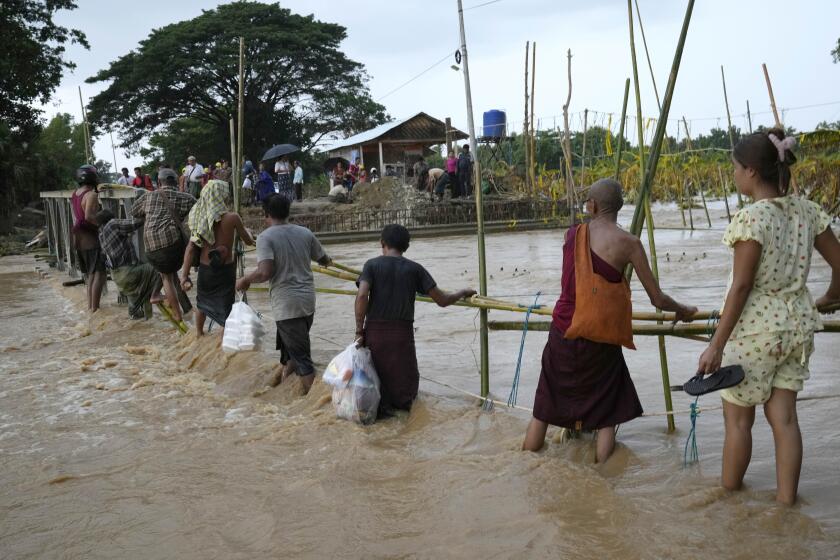Somalia refugees risk passage to Yemen
Holding her baby above her head, Rihanna Mohammed tumbled out of a boat in rough seas and swam to the Yemeni shore.
“It is a wicked, wicked journey,” said the refugee from Somalia, her feet wrinkled and yellowed, her face speckled white with sand. “Waves were crashing over us the whole way. We were terrified.”
But she was lucky. Mohammed, her 1-year-old daughter and 48 others made it alive, fleeing the war and poverty of their native land for the uncertainties of a new one. Thousands make the journey every week in fleets of battered fishing boats sailed by smugglers.
Most of those crossing will end up in refugee camps or fan out across the cities and villages of Yemen. Others will disappear into rugged tribal lands to join the ranks of an affiliate of Al Qaeda or enlist with a band of Shiite Muslim rebels -- the Houthi -- fighting a civil war with government troops in the north.
The poorest country in the Arab world, Yemen can barely accommodate its own, much less the dispossessed from other lands.
“Right now, we are torn,” said Ali Muthana Hassan, Yemen’s deputy foreign minister. “We have many problems of our own in Yemen -- we have war, Al Qaeda, our own citizens do not have jobs. But we have a moral obligation to accept them. And right now, we don’t have a choice. Next year, more will come. Many more will come.”
But many of them never make it to shore, and on those days, Atek Saleh watches the desperate drown.
He and six other men in the Mayfa Hagar region of Yemen’s southern desert, the Hadhramaut, make up the coastal patrol. It’s an arm of the Yemeni charity Society for Humanitarian Solidarity, and its main job is driving along the coast in SUVs at dawn to collect the most recent African refugees who’ve made the two-day passage across the Gulf of Aden.
“Some of them could swim, but others were crushed when the boat went over,” said Saleh, recalling a recent morning when a vessel capsized. “There was an old woman whose leg was caught by a rock. She was alive -- we could hear her screaming -- but we couldn’t get to her in time. She screamed and screamed, and then she drowned.”
He gazed into the water. “Even in my sleep,” he said, “I still hear her screaming.”
Last year, more than 74,000 Somali and Ethiopian refugees arrived on Yemen’s beaches along the Gulf of Aden and the Red Sea. That’s 50% more than in 2008, according to the Office of the United Nations High Commissioner for Refugees. With no end in sight to either the war in Somalia or the five-year drought in Ethiopia, their numbers are expected to rise this year.
The roughly 200-mile passage to Yemen from port cities and fishing villages in Somalia and the shorter voyage from Djibouti are treacherous. For two days, refugees are crammed shoulder to shoulder in creaking boats -- nothing more than 30-foot wooden dinghies.
Along the way, they face high winds, deadly storms, pirates and possible detention by the Yemeni coast guard or international anti-piracy patrols. Many are women and children. Some are raped, beaten or thrown overboard by smugglers wary of being caught if they deliver their human cargo too close to shore. Untold numbers disappear at sea.
When the coastal patrol finds the bodies of refugees, it transports them to one of three UNHCR-run cemeteries in southern Yemen, which buried more than 315 last year. Ahmed Haj, who helps run Al Hamra, the UNHCR cemetery in Mayfa Hagar, said they had buried 81 people since it opened in September.
“Not everyone gets their own grave,” he said, pacing a graveyard the size of a football field a few hundred feet from the shore. Each grave was marked by a blue number on a white post pounded into the ground. The sour smell of decomposing flesh hung in the air.
“They think they are coming to paradise, and this is their destination,” Saleh said. “They come from one thing to a worse thing. It is hell.”
Faahiye Abdul, who was on a boat that had arrived that morning, said she had known how dangerous the journey would be. “But what was I supposed to do?” she said. “Every day in Somalia, I fight for my life. If you go outside, you die. So what if I die coming here? I will die anyway.”
To get her baby across the sea, Mohammed, like most of her fellow Somali passengers, spent a year working, selling vegetables on street corners to earn the $120 smuggler’s fee. Others begged or sold their homes, their land, their clothes. Some sold themselves.
If you ask what it is they are running from, they shrug, part stoicism, part resignation.
“Troubles,” they say. “Troubles.”
And if you ask again, they will tell you that their mothers were killed in front of them, that their daughters and sons were dead, that their families were starving, that everyone in their neighborhood was dead. That there was so much blood in the street you couldn’t walk in a straight line.
“In Yemen, I will live,” said Amina Saleh Ali, who said her sister, grandfather and grandmother were killed last year by Shabab, Somalia’s largest group of Islamist insurgents, which allegedly has links to Al Qaeda. “I will live here. I will try to work. Maybe I can get a job as a maid. I don’t know what I will find here. All I want is a good life, that’s all I want.”
Somalis, who have official refugee status in Yemen, are given the option of going to a UNHCR refugee camp near the port of Aden. Ethiopians, who are considered illegal immigrants, are given 10 days to petition for asylum. But most of them try to hide in cities, where they are sometimes harassed, imprisoned and deported.
Yemen had been primarily a transit country, where refugees could pay another smuggler to get them to Dubai, in the United Arab Emirates, or Saudi Arabia. But with economic opportunities withering in the Persian Gulf states, more are staying in Yemen, the only nation on the Arabian peninsula that formally accepts refugees. An estimated 750,000 African refugees live in Yemen, the government says.
The southern beaches are wide, and when dawn breaks Saleh doesn’t know what he’ll see. “I pray we find them before it’s too late,” he said.
Edwards is a special correspondent. Times staff writer Jeffrey Fleishman in Cairo contributed to this report.
More to Read
Sign up for Essential California
The most important California stories and recommendations in your inbox every morning.
You may occasionally receive promotional content from the Los Angeles Times.










